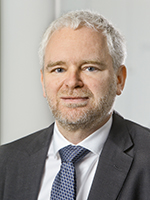With more than a third of the world's energy consumption and around 50% of CO2 emissions, the industry plays a major role in achieving the climate goals that require a drastic reduction in CO2 emissions, energy consumption and the use of renewable energies. We are working on methods and technologies for a sustainable energy supply for industry with a focus on energy supply and consumption. The research area is concerned with technology development to increase energy efficiency, e.g. through heat recovery with industrial heat pumps and the integration of optimized thermal storage. We develop mathematical methods with which we can design decarbonization scenarios for industrial companies. With the help of dynamic process models we work on the holistic optimization of operating strategies, the flexibilization of energy supply and the integration of new storage and conversion technologies.
Industrial heat pumps
for more than 10 years research activities to industrial heat pumps (compression and adsorption heat pumps, both on component and on system level)
- cooperative research projects for the development and demonstration of heat pumps
- Increase of flow temperatures up to 160°C
- natural and synthetic refrigerants
- from laboratory scale prototypes to industrial demonstration
- industrial demonstration of high temperature heat pumps
High temperature thermal storage
- Integration of heat accumulators for the energetic and production-related optimization of processes and plants
- Concept development and plant design
- High energy densities up to 200 kWh/m³
- High operating temperatures: organic phase change materials (polymers, etc.) up to 300°C, inorganic (salts, metals) up to 800°C
- Complete implementation of the storage solution with experienced industry partners (engineering, manufacturing, process integration - industry 4.0, commissioning, optimization)
- Monitoring for the proof of efficiency increase and energy saving
Design and operational optimization of industrial processes
- Cost optimization of industrial energy systems: Process scheduling, heat recovery, component integration of storage tanks, heat pumps etc. as well as the cost-optimal selection of (renewable) supply systems and their operation
- Decarbonization scenarios for industrial sites
- Comprehensive numerical simulation skills:
- Dymola/Modelica, IPSEpro and Matlab for the mapping of industrial energy systems
- Computational Fluid Dynamics (CFD) for detailed analysis of heat and mass transfer
- Digital twins of components and production plants in the form of functional mockup units and neural networks
- Control and regulation concepts for electrical, thermal and mechanical systems
- Data analysis of operating data for statistical evaluation and fault detection (statistical methods for classification, regression analysis, validation, optimization and prediction)
![[Translate to English:] Efficiency in Industrial Processes & Systems Symbolfoto: Das AIT ist Österreichs größte außeruniversitäre Forschungseinrichtung](/fileadmin/_processed_/d/d/csm_042_20150507__c_schedl_AIT_high_94d99a4bc7.jpg)



